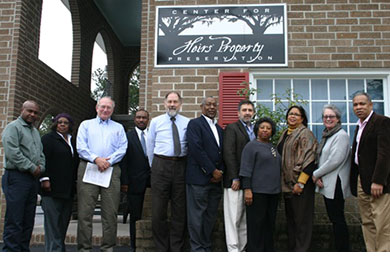DNR News
** Archived Article - please check for current information. **
June 11, 2015African American family land protection success stories highlighted in Lowcountry celebration
The Sustainable Forestry and African American Landowner Retention Program recognized accomplishments of its Woodlands Advocate Institute members at a recent event in the Lowcountry.
The Center for Heirs' Property Preservation, based in Charleston, hosted the event April 10-11. The Center’s mission is “to protect heirs’ property and promote its sustainable use to provide increased economic benefit to low-wealth families through education and legal services.” The gathering celebrated the success of families who are wisely managing their forests and renewing the connections of family members to their lands, and to local communities.
renewing the connections of family members to their lands, and to local communities.
Sam Cook, director of sustainable forestry for the Center, said: “The program is sponsored by the U.S. Endowment for Forestry and Communities, in a joint venture with the Natural Resources Conservation Service and Forest Service of the U.S. Department of Agriculture. It focuses on educating black landowners on resolving land tenure issues, utilizing sustainable conservation practices, and properly managing and realizing the full value of their family forest land. And while the program is centered in the South Carolina Lowcountry, we believe it has great potential to spread to other parts of the South, and to family lands owned by folks other than African Americans.”
Johnny Stowe, wildlife biologist for the S.C. Department of Natural Resources (DNR), said he agrees with Cook about reaching out to other groups: “It is time we started encouraging the growing Hispanic population to get involved in conservation and to invest in lands. Their close sense of family bonds lends itself well to this movement, and while many of these families are relatively new to the South, family land ownership has to start somewhere.”
Robert Bonnie, United States Department of Agriculture Under Secretary for Natural Resources and Environment, who recognized landowners at the event, said: “Some of these landowners are local, and some now live far away, but they all share the common bond of deep roots in the lands their ancestors lived on and made a living from. The Center is reviving and strengthening these bonds in a way that will ensure they remain strong in future generations.
Conservation on public land is absolutely vital, but the key to protection of forests and wildlife in South Carolina, where 88 percent of the forest land is privately owned, largely depends on what happens on family lands. This project gets to the heart of what pioneering conservationist Aldo Leopold meant when he wrote that the most important conservation is what happens on the ‘back forty’ acres. This project is one of the most exciting and innovative things in the conservation arena in a long time, and history will document its success.”
Willie Simmons, DNR regional wildlife biologist, said: “I was both impressed and inspired by what I saw in the property owners and by what I witnessed in the staff for the Center for Heirs' Property Preservation. Sam Cook is involved in an organization that transforms landowner’s beliefs about how important land is in the process of connecting us to an area and our family history. The Center for Heirs' Preservation helps to resurrect the connection between people and family land that has been lost over the years. No longer do landowners view their land as useless and something to be discarded for a few dollars, or something that is a drain on them because of taxes.
"The Center for Heirs' Property Preservation instructs landowners on how to make sure their land stays in their family; it opens their eyes to how their land can work for them and their descendants, which restores people's connection to their land, their family and their community. This is a program that could be applied to all small landowners in South Carolina and it would benefit families throughout our state,” Simmons said.
More News
- African American family land protection success stories highlighted in Lowcountry celebration
- Eighteen teams accept the natural challenge of the 2015 SC Envirothon
- Haile Gold Mine land transfer to DNR creates Wateree River Heritage Preserve, addition to 40- Acre Rock
- Renew your state hunting and fishing license
- Feeding, watering manatees is illegal
- Commercial shrimp trawling season open
- June 15 deadline to apply for 2014 public alligator hunting, special WMA season
- Hummingbirds returning to South Carolina
- DNR offering virtual hands on boating safety classes in July
- DNR dedicates memorial plaque to fallen officer
- Spawning season for a “Living Fossil”
- Statewide deer harvest decreases in 2014
- DNR offers guidelines for dealing with bears; report a sighting on website
- Loggerhead nest kicks off sea turtle season
- DNR hosts series of youth fishing rodeos/family fishing clinics around the state
- Freshwater fishing trends
- Saltwater fishing trends
- S.C. weekly tidetable
- DNR video
- Archived news releases
